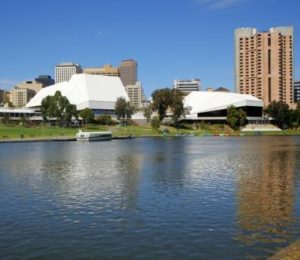
The true value of the 2013 Adelaide Festival to the community and the state will be studied by a team of international experts led by Flinders University.
The Cultural Value Research Project (CVRP) will survey Festival-goers and members of the general public alike to determine how they value the Festival in terms of its contribution to the State’s reputation, as well their sense of identity and wellbeing.
Flinders University’s Head of Tourism and CVRP team leader, Dr Steve Brown, said the project will, for the first time, put a dollar value on culture beyond the purely economic.
“The ‘economic multiplier’ effect of festivals – how they boost revenue to the aviation, hotel, tourism and hospitality sectors, for example – is well-established. But the value of the Adelaide Festival’s contribution to the social fabric of the State has never been measured,” Dr Brown said.
“Since its inception in 1960, the Adelaide Festival has been an integral part of our identity. Its value to the marketing of the State is recognised. Now, we want to measure the feeling of wellbeing and the ‘pride’ South Australians derive from the Festival and put a dollar value on it,” he said.
Adelaide Festival Chief Executive Karen Bryant said that it “is incredibly useful for us to be able to quantify the culture value of our festival to the community we serve”.
“We’re thrilled to be participating in one of the first studies using this ground-breaking research,” she said.
Dr Brown said the project has the potential to examine a wide range of other local and interstate festivals, such as Womadelaide, the Adelaide Fringe and the Perth International Arts Festival, in order to get a complete picture of the cultural value of these events.
International event researchers, Professor Tommy Andersson (Gothenburg University) – who trialled and tested the project in Europe – as well as Professor Donald Getz (Calgary and Stavanger Universities) and Mr Anders Nordvall (European Tourism Research Institute) will join the project team in Adelaide for this survey.
“The idea for an international collaboration in this research area came out of a seminar held in Gothenburg in mid-2009,” Dr Brown said.
“Since then an enormous amount of work has been done to create this system and we now have an accurate means of measuring the kinds of impacts festivals and events have on culture and society,” he said.
The eight-minute survey will ask participants, for example, how they determine value for money and what they would be prepared to pay for their festival experience.
Their responses will be recorded on tablets using software developed by staff and students in the University’s School of Computer Science, Engineering and Mathematics as part of the Mass Gathering Data Acquisition and Analysis (MaGDAA) project.
“Once the initial roll out is underway, we anticipate studies of cultural institutions such as libraries, museums and art galleries will also be undertaken,” Dr Brown said.


I find it perplexing that this study will “put a dollar value” on culture, well-being and pride “beyond the purely economic”. Huh? Isn’t dollar as a unit of measurement only meaningful in economic terms?
I also wonder how this value will be gauged? Are the implications that low “dollar-value” cultural events will be got rid of? Does “dollar value” equate to a sort of a popular vote on what is valueable? In “dollar” terms what do culture and well-being mean? Might some things be valueable in ways that can’t be measured, or in ways that are not immediately apparent? Is there a danger that we will end up with no cultural activities at all when people claim that shopping is the best activity for their “well-being” and instead we will have nothing but a giant market place?
All thanks go to Dr. Brown and all members of this international research team, to conduct such break-through research. Putting a “dollar” value on the cultural aspect of festivals/Adelaide festival is not easy job, as the reasearch team has to conduct the reasearch itself as well as convincing the event industry of its viability. I wish the international research team all the best, and I will be looking out for the research results and recommendations.
Best Regards,
@emadmonshi